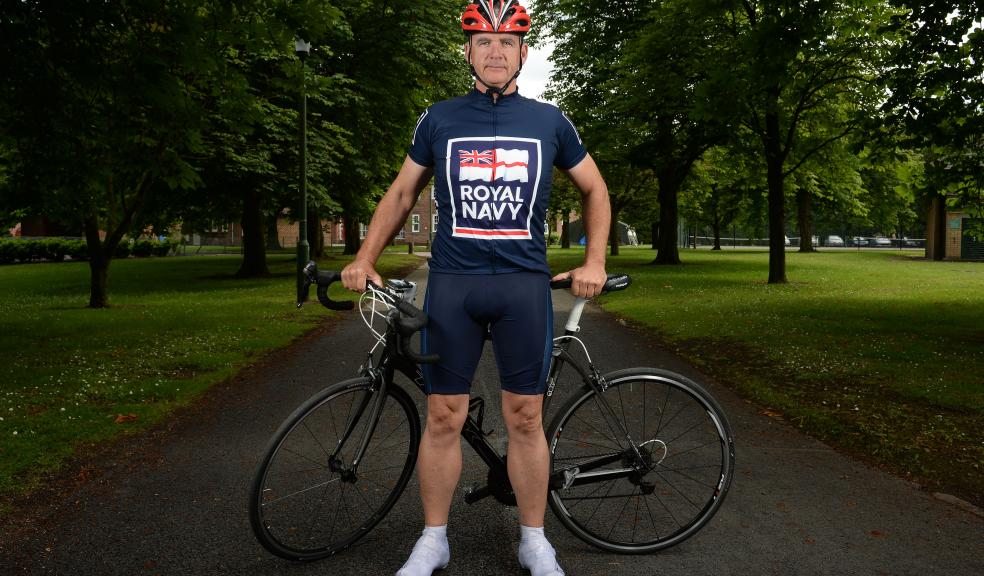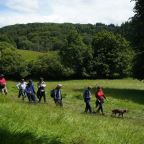
Royal Marine cyclist from Plymouth tests Le Grand Depart
As cycling fever grips Yorkshire in advance of Le Grand Depart of the Tour de France 2014, a Royal Marine cyclist from Plymouth has been cycling the 390 kilometre route in the county to assist in the preparations for the prestigious event.
Captain David O’Connor (48) was one of a 70-strong Armed Forces peloton that pedalled the two day route from the historic house of Harewood on the outskirts of Leeds to the centre of Sheffield. Exercise “Maillot Jaune” or translated Exercise “Yellow Jersey” will be one of a series of test exercises being run in preparation for the world-famous cycling race.
“Preparations for Le Grand Depart of the Tour de France 2014 have been underway for many months now and we are grateful to the military cyclists for their assistance with our final planned tests to prepare for the race. We are on track to create a memorable weekend of cycling which will be seen across the world,” said Nicky Roche, Chief Executive of the Tour de France Hub.
David has completed 31 years service in the Royal Marines and is the Senior Corps Commission Officer and is based at RMB Stonehouse in Plymouth. He has taken part in numerous exercises worldwide and has served on operations in Northern Ireland, Iraq and Afghanistan.
He is a member of the Royal Navy and Royal Marines Cycling Association and recently completed the Royal Marines 1664 Challenge in Spain and France over 15 days.
“I’m a late-comer to cycling – I’ve only been cycling for about five years, “ said David.
“So it’s as a result of a failing body – all sorts of normal wear and tear as you’d expect after many years in the military - cycling keeps me active. It’s very good for strength and fitness and it’s the one thing I can do and still be able to tie my shoelaces up in the mornings!
“I recently took part in the cycling phase of the 1664 Challenge, which was cycling 2,200km through Spain and France, finishing in Normandy – as part of the overall 1664 Challenge which was celebrating the Royal Marines 350th anniversary this year – so that was my biggest achievement on a bike, completed last month. And, again, it was another unique opportunity – like this Tour de France test event.”
The arduous route weaves its way past some of the most beautiful landscape, historic places and industrial heritage in the region. The first day saw David cycle the 190 kilometres (118 miles) through Skipton and the Yorkshire Dales past Aysgarth Falls and climbing the famous Buttertubs – an iconic 250m high ascent expected to challenge the Tour de France riders.
“With regard to the next couple of days, it’s not going to be easy,” said David.
“Riding around these roads and these routes is going to be a significant challenge and it’s going to be interesting to see how the pace is set as well. I’m definitely going to put myself in the slow group to start with, that’s for sure! Nothing quicker!
“It’s a unique opportunity to cycle the first two stages of the biggest cycling event on the globe, so I count myself as being very lucky to have an opportunity to ride in something so grand.”
Unlike the sprint finish expected in Harrogate at the end of the first day of the Tour de France, the military “peloton” finished at an unusually leisurely pace.
“We are not here to race, we are here to do an important job for the organisers, the Yorkshire Tour de France hub and to savour just what the professional racing cyclists will endure,” explained Colonel Stuart Williams, Chairman of Army Cycling.
“For the military cyclists this is a unique opportunity to cycle this challenging route. For some it has been an eye opener and something to aspire to achieve. For others it has been a personal test of their ability and their fitness.
“Fitness is essential to all members of the Armed Forces to enable them to do their job which can be physically demanding. Talented sportsmen and women in the Armed Forces are given time away from duties to train and participate in their sport and fulfil their potential. Amongst the military “peloton” we have cyclists who are members of not only the national Armed Forces teams but who cycle for their country as well.”
Nursing a few muscle aches, the second day saw the cyclists cycle out of York across Ilkley Moor not “Baht ‘at” as in the words of the traditional song but with their cycle helmets on, up the cobbled main street of Haworth made famous by the Bronte family through Todmorden into Huddersfield and ascend the long steep climb to Holme Moss. They passed Langsett reservoir and completed the day’s 200 kilometre (125 mile) ride in the famous steel city of Sheffield.
The military will take part in the Leeds Festival of Cycling on Saturday and Sunday 5 -6 July at Harewood House in Leeds. Visitors will be able to enjoy a range of military style activities, see the famous Red Arrows aerial display team and find out more about life in the Armed Forces. Harewood will be visited by the Tour de France peloton before it leaves Leeds
The Tour de France cycle race is the largest annual sporting event in the world and was established in 1903. It has a huge global following, especially in neighbouring counties, which is why it regularly starts outside France - the last time it visited the UK was 2007. The whole event takes place over three weeks and covers a distance of 3,500km (2,200 miles) and 22 teams of nine riders take part to win the winner’s yellow jersey.
This year the Tour de France returns to the UK for three stages It will be the first time the Tour has visited the north of England, having previously only made visits to the south coast and the capital. The first two stages are in Yorkshire and the final UK stage of 159 Kilometres (99 miles) is from Cambridge to London on Monday 7 July 2014.











